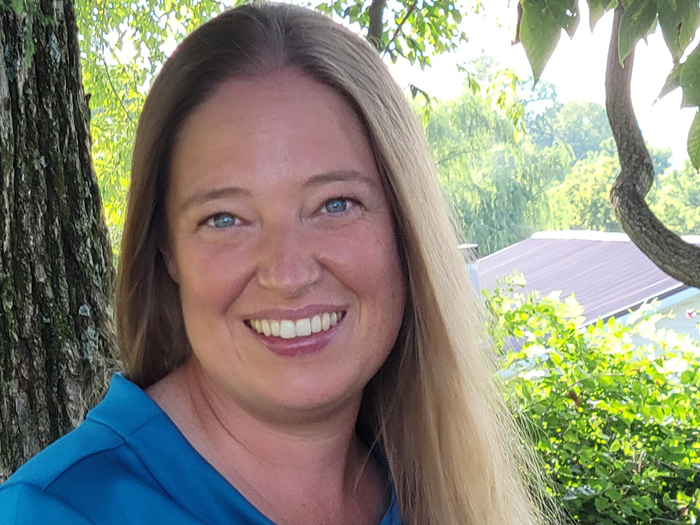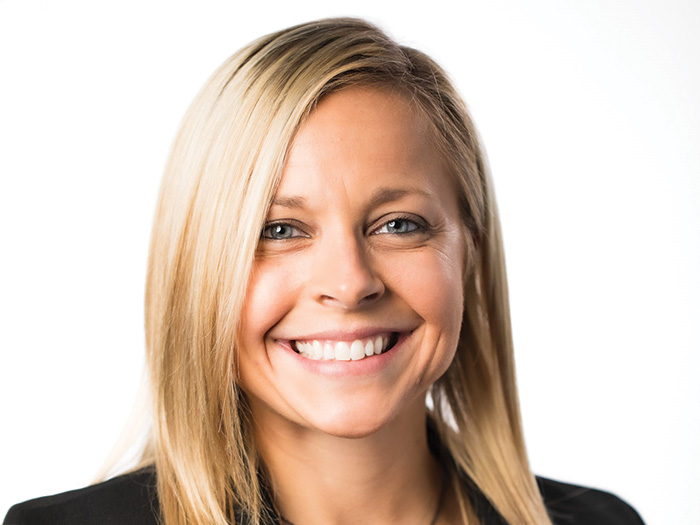14 Questions About Equine Insurance for AXA XL’s Katherine Short

In June, Dan Reynolds, the editor-in-chief of Risk & Insurance®, got the chance to connect with Katherine Short, who is based in Lexington, Kentucky and works in AXA XL’s equine business as a claims specialist.
Short has had a passion for horses. She has been a rider for 36 years and has competed in both eventing and dressage events.
What follows is a transcript of that discussion, edited for length and clarity.
Risk & Insurance: Talk to me about your journey into equine insurance, or into insurance in general, how did this all go?
Katherine Short: I moved to Kentucky in 2010 for the World Equestrian Games. I was asked to help put together the demonstration for the Connemara Society that we had there. It was a good time to leave my other job. And I said, “If I hate it, I’ll go home; and if I like it in Kentucky, I’ll stay in Kentucky.”
That was 12 years ago. I moved down here and then it was like, “All right, I’m going to stay, I need to get a real job,” and I ended up working for Hagyard Equine, which is one of the big clinics down here in Kentucky that’s right across from the horse park.
Part of my job there, as the receptionist, was to sort of liaise with the insurance adjusters on horses that were in the clinic with us, send them reports, help them with updates, that sort of stuff. And so one day, one of the girls happened to say, “Hey, if you’re ever looking for a job, we’re always looking for people who know what they’re talking about.”
I happened to be looking for a job at that point, so I moved over to an independent adjusting firm at that point called RJ Ketch. And I was there for, I think, two years, and I mostly adjusted for, at that point, it was XL Insurance, so most of the claims that I had were through them. When the mergers started happening, we heard that they were going to start moving claims handling in house, and I happened to see the job posting come up for that, and that’s how I moved over here.
R&I: I was going to ask you what you find engaging about that work, but, really, you have this kind of ideal situation where you’re combining your passion with your job, right?
KS: I like being able to help people through a not-so-great time in their lives. As a horse person, I personally know how hard it is when your horse isn’t feeling good or if your horse has to get put down. I feel like having that background in horses, I can talk to them, I can let them know there’s a human side to it.
We’re not just this big insurance company that doesn’t care and doesn’t know what we’re talking about. I’ve been through a lot of the stuff that they’ve been through.
R&I: In the claims that you’re working with, where does equine insurance really live in terms of sectors? Is it more the thoroughbreds, is it dressage?
KS: It started out mostly thoroughbreds, just mortality and colic surgery coverage, but the sport horse side is getting bigger and bigger every year, now that we have major medical. So that will pay for anything that’s outside routine care for the horse. If they have a tendon injury, or a fractured splint bone, or a really bad abscess in their foot, that is something that we can pay for with the major medical, and that’s getting a lot bigger every year. I would say at this point, my claims are probably a little heavier on the major medical side with sport horses.
R&I: What do we classify as sport horses?
KS: A trotter or a pacer or a thoroughbred that races, those are considered racehorses, versus a sport horse, which could be anything from dressage, eventing, Western disciplines. We don’t insure a lot of saddlebreds, but some companies do. It just depends on each company, what disciplines they’re willing to take on. But I would say a majority of our horses are English disciplines.
R&I: And you said major medical is a growing piece of the business, correct?
KS: As the sport horses are getting more and more expensive and traveling more and showing more, it’s something that is really nice to have, to have that backup of, if my horse needs a $10,000 surgery on his tendon, it’s something that’s going to get covered under the major medical.
R&I: There’s also the breeding side to consider, right?
KS: At least for our company, we offer a couple different types of breeding coverage underwritten out of the London market . So you can get what’s called Pro-Foal, which is insuring, basically, the unborn baby. So if the mare has an abortion, if the mare ends up dying of colic, or something like that, it’ll pay for the loss of the baby itself. We also have some coverages for stallions, for infertility.
Then we offer some racehorse surgical. So if a racehorse needs to get an actual surgical procedure, they can get that covered. So it’s not going to cover tendon rehab, like the major med does, but it does cover anything that the horse has to go under general anesthesia for.
We have a bunch of livestock that we cover too. And we do everything from mortality on cows, cattle, pigs, goats, sheep. We did a lot of alpacas for a while.
Then we also offer specified perils, which is a very limited list of things that are covered. So those are usually for big herds of cattle, so it’s snowstorms, lightning, drowning, that sort of stuff is covered by those policies.
We also offer some motor truck cargo coverage for when they’re shipping cattle around, if they overturn, for example. Most of our specified peril exposures with the big herds usually comes from snowstorms, so big losses of the cows. They huddle together to stay warm and they suffocate each other. Those are the big losses that we typically see on that policy. And we do get some struck by lightning claims as well.
R&I: You’ve got coverage in Japan and Argentina, all over the world?
KS: As long as the insureds have a United States address, we can insure the animals all over the world, as long as they buy territorial extension to cover wherever they happen to be. So these big show jumpers that fly over to Europe for the summer and compete all over there but their owners live in Wellington, Florida, we’ll cover them.
R&I: When it comes to equine, where do you tend to see the most claims?
KS: It’s usually more centralized on East Coast and California. There’s just not as many things in the middle of the country. In the winters, we get a lot of claims out of Florida because everyone goes down to Florida to compete, but I would say a majority of our claims are going to be East Coast-based.
R&I: What type of claim would be your most frequent claim, like what kind of injury or loss?
KS: It’s pretty diverse. I mean, it’s usually some sort of lameness, whether it’s a tendon, or an inflamed bone, or a bruise, or something like that. We do get some claims here and there for, if they have a tooth that’s abscessing that needs to get taken out, if they got a bad cut that gets infected.
The major medical comes with a deductible on it, so we don’t have a lot of small claims because the deductibles are usually $400 to $750, I think, is the most we have. So if your horse just gets a little laceration, it gets stitches and that’s all that happens, it’s going to be under that deductible, so we don’t open any claims for it. We do require that that sort of stuff does get reported to us, just so we can put a note in the file about it, but it’s not something we’re going to open a claim for.
R&I: When it comes to a racing injury, how big can those major medical claims get?
KS: If it’s a tendon issue and they end up needing to get surgery, and then, a lot of times, they’ll get sent off to a rehab center, and if all goes perfectly according to plan, that can easily be $10,000. If there’s any complications or they happen to re-injure it, it can easily get to $20,000. I would say the majority of our major medical claims stay under $10,000.
A lot of my conversations with people are, “Just so you know in the future, this is what we expect to happen. If you think it’s going to be a problem, call us. If you don’t think it’s going to be a problem, call us.” We don’t have to start a claim, we can put a note in your file, [that says], “Hey, my horse was stupid and tried to jump the fence today and he cut himself up a little bit and I don’t think it’s going to go over my deductible.”
R&I: When a horse has to be put down, do you get involved in those conversations?
KS: We would require that before a horse gets put down, unless it’s an absolutely catastrophic issue, that we be advised ahead of time and we can talk to the vet at that point. One of the stickier things with racehorses versus sport horses is they’re seen in a little bit different light.
Sport horses tend to be more of a pet, so people are going to, “I want to save this horse, and if he has to live in my backyard for the rest of his life, that’s fine.” And race horses, they have to make money, and so they’re sort of looked at in terms of that. Like, “All right, well, if we spend the money and we fix this horse up, is he ever going to race again?”
That’s where being a horse person comes into play the biggest, I think, is being able to talk to a vet, ask the right questions, and know what they’re talking about, and know, is what they’re recommending something that we would consider heroic, or is it a logical conclusion for what’s going on with that particular horse?
So we do speak to vets quite a bit about recommendations and things that they want to treat or not. We do have a lot of those conversations, like, “This is what your vet told me. This is what they’ve recommended for treatment. We think that is a logical conclusion on their part, and we are going to require you to do that.”
Now, if they decide, “No, I’m not doing it,” they certainly can put the horse down. It’s their horse, it’s their property, they can do what they want with it, but we just aren’t going to be able to pay them that claim.
And people understand that for the most part, and some of them will say, “I just can’t put the money into this horse. We’re going to put him down, we won’t submit a claim. ”
People will get grumpy and they’ll get mad, and I understand, but I am also required to do with the policy covers. I can’t bend the rules, because then everyone else would want the rules bent for them in those situations. So that can get hard, and being patient and explaining it to people… And usually, you have to explain it a couple times, and a lot of times, the first time they yell at you, and then they’ll call back later and you’ll explain it again, and maybe they’re a little calmer that time.
It’s just sort of quiet persistence and just, “This is the policy language, this is what needed to happen, this is what didn’t happen. And I’m sorry, I just can’t find a way to have this covered.”
R&I: What are some of the more common sticking points? We talked about this one scenario, where the owner wants to put the horse down and you’d say, “The vet says we can save this horse.” What are some of the more common sticking points when it comes to resolving equine claims?
KS: I think the biggest one is people not fully understanding the coverage that they’ve bought. With major medical, there is a specific exclusion within it that you have to immediately report anything to us, whether you think it’s a claim or not, for anything outside routine care. A lot of the policies have wording in there that says, “We will not cover any invoices more than 30 days prior to you reporting a claim to us,” and that is hard for people. “Well, I just got the bills yesterday.” Well, it happened four months ago, I can’t cover these invoices for you.
I can understand their dilemma. Before I was in insurance, I didn’t read my policy either. I didn’t really know what it meant, it’s a lot of legal jargon. I do get it, but, again, at the same time, I have to go by the policy wording and cover what I can cover.
A lot of my conversations with people are, “Just so you know in the future, this is what we expect to happen. If you think it’s going to be a problem, call us. If you don’t think it’s going to be a problem, call us.” We don’t have to start a claim, we can put a note in your file, [that says], “Hey, my horse was stupid and tried to jump the fence today and he cut himself up a little bit and I don’t think it’s going to go over my deductible.”
Great, we’ll put a note in your file, that way we have record that you have contacted us about this in a timely manner. And if, in a month, that laceration is now infected or it’s causing adhesions or something like that, we have that record. You reported it timely, we can cover it for you.
I think that’s our biggest one, especially for major medical, is that immediate reporting. The livestock stuff, we definitely have that immediate reporting. Someone might say, “Oh yeah, my bull died two weeks ago.”
“Well, did you have a post mortem exam done?”
“No.”
“Well, why didn’t you call us?”
“I forgot.”
“I can’t do much if you didn’t have that postmortem exam, which is a requirement of your policy, I just can’t cover it.” &








